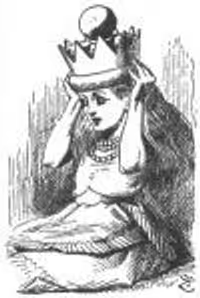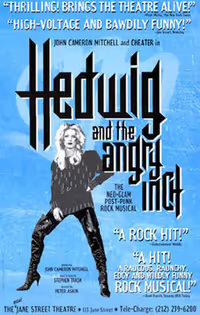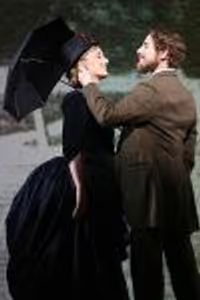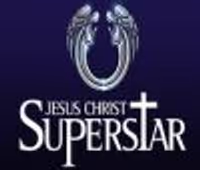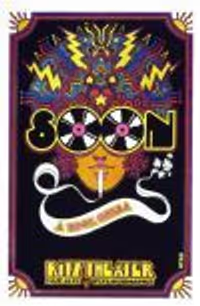Censorship in HAIR at the Old Globe
#1Censorship in HAIR at the Old Globe
Posted: 8/30/21 at 10:59am
While in San Diego this past weekend, I attended the Old Globe's revival of HAIR presented outside at the beautiful Lowell Davies Festival Theatre. The production appears to utilize the revised script from the Diane Paulus production, but there were some cuts made to the score that I found very odd.
Firstly, the production cuts "Black Boys / White Boys" completely.
Secondly, in the anti-war song "3500," the production strangely cuts the single word "Nxxgertown" completely. The cast literally sings "Prisoners! It's a dirty little war! 3500..."
I'm guessing that these cuts were made because somebody involved in the production took offense to the racial aspects or implication of lyrics in these two songs.
"3500" is adapted from Allan Ginsberg's "Witchita Vortex Sutra," In the poem, the word eliminated from this production has a deeper meaning, as explained in this article.
http://hairdramaturgy.blogspot.com/2010/04/prisoners-in-what-town-now.html
I'm curious if anyone has any specific input as to what was behind the decisions to alter the score for this production. I thought censoring HAIR, a show willfully devised to provoke audiences, seemed pointedly bizarre.
#2Censorship in HAIR at the Old Globe
Posted: 8/30/21 at 11:06am
Oof.
I certainly understanding taking offense or being made uncomfortable but it's sort of the point. I also understand why folks might think the antiquated language/attempted provocation makes Hair a show that should be retired. I don't understand doing it anyway and sanitizing it. Hair is very pointedly a product of its time.
As you say so eloquently, the provocation is the point.
#3Censorship in HAIR at the Old Globe
Posted: 8/30/21 at 11:15am
Yeah... this is not a show that works when it's censored. There are aspects of it that are difficult and uncomfortable, but those aspects are there for a reason and they make the show what it is - and are a huge part of why it was so revolutionary in its time. There's no point in doing the show if you're gonna clean it up - it loses so much without those difficult moments.
#4Censorship in HAIR at the Old Globe
Posted: 8/30/21 at 11:26am
To say "the provocation is the point" is, IMO, kind of a warped, over-simplified take on this. Those racial elements were meant to provoke people with outdated racial politics, in the 1970s. Not casual, liberal theatregoers in the 2020s. The piece uses language, ideas, and sensibilities that are now very outdated. And obviously, they weren't deliberately outdated at the time it was written, so to say that it was "the point" is simply untrue. We can't just use "provocation" as a catch-all buzzword without actually examining WHAT it was meant to provoke, from WHOM, and WHEN.
Calling it "censorship" is likewise a warped way of looking at this. The show is not being forcibly "censored" by the powers that be. It's being altered by artists and estate-holders so as to better speak to our time. The way dozens of shows do every year. It is in no way an equivalent to actual, forced censorship that has been enacted on art pieces throughout history.
Whether these specific changes to the show are actually artistically wise is another question, and I can see it being open to debate. I think this issue really highlights how Hair is an outdated piece, and how its truly subversive qualities have been bastardized long before this. Or rather, they were doomed to fade away when the show was presented in different contexts.
EDIT to clarify: If there IS a case for those cut sequences being provocative in a specific way that's actually productive for where we are in 2021, I'm open to hearing it. But I don't fee like that's the case. What is Black Boys / White Boys meant to provoke from an audience who is fully onboard with interracial relationships? And if the answer is "nothing," then what value are we getting from hearing a lot of the language that hyper-sexualizes Black male bodies in a way that we can now view as somewhat demeaning, and in line with problematic tropes?
#5Censorship in HAIR at the Old Globe
Posted: 8/30/21 at 11:38am
But did they cut the nudity? Asking for a friend.
#6Censorship in HAIR at the Old Globe
Posted: 8/30/21 at 11:44am
The majority of Hair is "outdated" if we're going to apply your definition. I think simply removing a handful of (what's now perceived) racial insensitive moments removes a lot of nuance from the piece and gives a pass to the many other outdated, insensitive things in the show. It's like when you try to "fix" Taming of the Shrew. It's not just a few parts that are kind of gross... it's the whole show. So rather than trying to "fix" something that is at its core problematic (though valuable and nuanced), you should present the work with its problems and let the audience see and judge the whole picture.
A "fixed" production of Hair lets the audience think The Tribe were non-racist, non-problematic sprites. This is obviously not the case. Racism was present, even among the supposedly anti-racist Tribe, and a production that isn't problematic creates a sanitized, false sense of history.
I do appreciate the thoughtfulness of your response, particularly your last paragraph, and I hope you don't think I'm being dismissive.
#7Censorship in HAIR at the Old Globe
Posted: 8/30/21 at 11:48am
Regardless of who, HAIR was always meant to inside debate and strong uncomfortable response from its audiences. The original production played all around the world and its global success I think is evidence enough that the receipt of provocation was successful.
My point is - if there is anything in the script and score of HAIR that modern audiences would be offended by then the show's anti-establishment themes are still relevant. Cutting any part of it to 'better speak to modern sensibilities and sensitivities' seems...just contrary to the point of it. Isn't seeing things like the taboo of inter-racial relationships and the trope of ethnic stereotypes in"Black Boys" through the lens of 1968 the whole reason for performing the musical today?
The show did have the nudity but it was so dark and upstage you couldn't see anything.
#8Censorship in HAIR at the Old Globe
Posted: 8/30/21 at 11:53am
This type of censorship has become the newest trend. We will start to see this happen more often now.
#9Censorship in HAIR at the Old Globe
Posted: 8/30/21 at 12:00pm
@KJisgroovy
Those are valid points - particularly regarding how the tribe is presented as racist or not. But that kind of nuanced commentary isn't really present in the text as written. Do we really feel like the text is trying to comment on the white characters' problematic racial blind-spots? I don't see that in the text, and it seems like re-framing the piece in that light would require VERY careful, smart, intricately crafted direction. Frankly, I'd love to see a production that successfully does that! A production of Hair that manages to investigate the ways in which the privileged characters perpetuate bias within their own community, despite trying to be allies, sounds like a brilliant production of Hair. I don't feel like the recent revival did that, and I would guess that there haven't been any major regional productions to date that have pulled that off.
Otherwise, it just seems like it too easily falls into the trap of like "look at this fun nostalgia piece!" that doesn't actually contribute anything of value to our current climate. And like you, I would rather that the piece hadn't descended to that level. But it feels like it already has. So I figure, if you're already doing Hair in a way that's not provoking any valuable discourse, you might as well take out the stuff that's going to elicit the kind of response that the piece didn't intent to provoke.
#10Censorship in HAIR at the Old Globe
Posted: 8/30/21 at 12:02pm
Did they use Jim Rado's revised lyrics for "Colored Spade" too? He wrote new ones for the scuttled NBC Live presentation, which were actually not terrible considering they were clear bowdlerization.
Broadway Legend
joined: 5/1/05
Blocked: After Eight, suestorm, david_fick, emlodik, lovebwy, Dave28282, joevitus, BorisTomashevsky, Seb28
#11Censorship in HAIR at the Old Globe
Posted: 8/30/21 at 12:08pm
@Tag - regarding the thread you linked to: if you were to read the statement put out by that that theatre company, it becomes clear that this wasn't at all a case of censorship, not even in the kind you're talking about. There was a lot of confusion from people on this board about what actually happened there, seemingly because people didn't actually read the statement. Nobody in that scenario was objecting to Sondheim's use of the N-word.
@QueenAlice - That's an interesting point about the anti-establishment angle - certainly anti-establishment mentalities ARE still provocative in today's climate, in a way that is in line with how the piece was originally written. But do you feel that the sections centering around race are contributing to the anti-establishment message of the piece as a whole?
#12Censorship in HAIR at the Old Globe
Posted: 8/30/21 at 12:16pm
JBroadway said: "@Tag - regarding the thread you linked to: if you were to read the statement put out by that that theatre company, it becomes clear that this wasn't at all a case of censorship, not even in the kind you're talking about. There was a lot of confusion from people on this board about what actually happened there, seemingly because people didn't actually read the statement. Nobody in that scenario was objecting to Sondheim's use of the N-word."
That isn't true. Some cast in the Assassins concert objected.
#13Censorship in HAIR at the Old Globe
Posted: 8/30/21 at 12:22pm
Unless I missed some updated info that came out after the initial statement, there was no evidence to suggest that. The production hadn't been able to go through their company-pledged racial sensitivity training, so they were using a placeholder word during rehearsals. When they realized they didn't have the time in the production schedule to stand by their promise to do the sensitivity training, they requested to keep the placeholder word, and were denied permission. So rather than go back on their pledged intentions to do the training, they chose to cancel. They specifically said in the statement that there was no issue with the use of the word in the piece on principle.
It's definitely possible - maybe even likely - that the whole situation was driven by cast complaints, but again there's no evidence to suggest that the complaints centered around Sondheim's use of the word, so much as they probably centered around how the production was handling it. Or if there were complaints in the cast about Sondheim's use of the word, the production made no indication that they planned to abide by those complaints carte blanche.
#14Censorship in HAIR at the Old Globe
Posted: 8/31/21 at 9:56am
@QueenAlice - That's an interesting point about the anti-establishment angle - certainly anti-establishment mentalities ARE still provocativein today's climate, in a way that is in line with how the piece was originally written. But do you feel that the sections centering around race are contributing to the anti-establishment message of the piece as a whole?"
JR -- I'm very much appreciating your considered thoughts and questions in this thread. To answer your question, yes, I do think the sections related to race are strongly tied to the anti-establishment message of the show. This production leaves in "Color Spade" which willfully throws in the audiences faces every single uncomfortable trope about the black community. "Black Boys" challenges the taboo of inter-racial communion - which, I'm sorry to say, is still uncomfortable for some people - more than you might imagine. And the omitted phrase in "3500" as written in Ginsberg' poem is a deliberate confrontation of the inequity of race in the time of war. All of this was shocking, illuminating (and intentional) in 1967-68 during the original staging of HAIR.
I have no idea what the decision was behind the changes made for this production, but I would be disappointed if it was some kind of reaction from the cast who refused to do the material because of some kind of moral judgment. I wonder if this production had sensitivity discussions. I can't imagine some black members of the cast not saying, 'yes, this is uncomfortable, but it's important to challenge audiences comfort, because that is the message of this musical."
Dolly80
Broadway Star Joined: 5/15/11
#15Censorship in HAIR at the Old Globe
Posted: 9/1/21 at 2:48am
“Racial sensitivity training”
Jesus. What a world we live in.
#16Censorship in HAIR at the Old Globe
Posted: 9/3/21 at 8:48am
Some things to keep in mind:
"HAIR" is not a timeless classic and was never meant to be.
To censor or alter the book/score is akin to attempting to re-write (or whitewash, if you must) history.
It is more poignant and meaningful to keep both score and book intact because that's how we, as the audience, become aware of change. Keeping the work as it was written allows us to draw conclusions regarding progress/regression re; its themes.
When the book and score are altered, so is history, and the piece becomes less relevant.
#17Censorship in HAIR at the Old Globe
Posted: 9/3/21 at 10:37am
@John Adams,
I agree that there's historical and social value in seeing pieces that are outdated, and analyzing them as such. I just think the company has to be careful about contextualizing it. Someone in a recent thread about Carousel suggested doing educational disclaimers, not unlike the ones they do for outdated films on Disney+ or TCM. I think that idea has potential, but it's hard to pull off in the theatre.
Moreso than film, the culture and medium of theatre is such that it's designed to be right here, right now. Artists make a conscious choice to perform something night after night, year after year. It's a more powerful gesture than just putting a film up for viewing on a streaming platform; it's inherently a more deliberate, more immediate statement.
I think it's easier for theatres like Encores!, because their mission is to present old pieces largely for their historical value, but that's not true of most theatre companies. Most companies claim in their mission statements to produce theatre that speaks directly to our time.
But I don't think you're wrong, John Adams - it probably is possible to have your cake and eat it too in this case. I just think it would take careful dramaturgical work, careful direction, careful contextualization on the part of the company, to make it clear what their intentions are in reviving the piece, and what they hope the audience to gain from it. Otherwise they run the risk of appearing out of touch, and thereby not serving their mission statements.
EDIT - An important component of my point that I forgot to include: unlike with films on streaming services, theatre spaces, and season slots are limited. So if a company's goal is to speak to our times, it's not that outdated pieces can't do that, but there will always be pieces that speak to our times more directly and accurately. So that's partly why the company has to be clear and deliberate about why they chose the piece to fill up a season slot, at the risk of appearing out of touch.
#18Censorship in HAIR at the Old Globe
Posted: 9/4/21 at 12:01am
Hiya Broadway!
Just a heads-up that I’m about to get pedantic on ‘ya about the use of the word “outdated”.
Now, it’s not to criticize the use of the word as “incorrect” or as being wrongfully used, but instead to acknowledge its use as the conduit for welcoming some critical thinking.
To my mind, HAIR is outdated only in the most literal sense of the word (in that the 70s are past and gone). Also, the emotional impact of the word evokes a sense of irrelevance, or no longer necessary; be it a large or small sense.
IMO, the show is a commentary/reflection on/of that specific time period. I think it’s more accurate to think of the show as a snapshot, a photograph, or a time capsule re: how people were thinking and behaving in that “now”.
To alter its text or score is like using PhotoShop to alter an old photo by copy/pasting present-day people/objects into the shot. You can tell it’s not “real” - and it isn't. Interestingly (or ironically), that is exactly what was done to create the poster for the original, Off-Broadway show at the Public Theater in 1967. (https://www.worthpoint.com/worthopedia/hair-musical-poster-original-1967-1801658280)
At the time HAIR was written and produced, there was a very large portion of the American population that was less mature, in both chronological age and physiological, mental development (the Baby-Boomers). I didn’t write “immature”. I wrote LESS mature because scientifically, physiologically and chronologically they just were.
Also (let’s face it), the social commentary in HAIR doesn’t contain a lot of mature or profound wisdom; neither did those baby-boomer hippies. Why did terms like “be-in” seem so clever anyway?
What do you do at be-in? “You BE, man! It’s so groovy!” …reminds me very much of Melania Trump’s slogan, “Be Best”. Both illustrate a lack of mature thought; neither verbiage is clever by half.
And was the nudity really brave, or daring? The original staging practically apologizes for the actors’ onstage nakedness. The lighting was dim, the nudity was viewable for only a few moments, and the entire company would/could not commit to being nude:
“Only those members of the company undressed who wished to do so that night. The play opened on Broadway [i]n the spring, and generally five or ten of the 26 actors and actresses undressed any one night.” (https://www.theguardian.com/theguardian/2013/sep/12/hair-musical-nudity-west-end)
As an aside: So yea… No, I don’t think HAIR is any Pulitzer Prize winner. Doesn’t matter though because…
It was also the era of The Counterculture; a LARGE Counterculture.
A counterculture is a culture whose values and norms of behavior differ substantially from those of mainstream society, sometimes diametrically opposed to mainstream cultural mores.[1][2] A countercultural movement expresses the ethos and aspirations of a specific population during a well-defined era. When oppositional forces reach critical mass, countercultures can trigger dramatic cultural changes. Prominent examples of countercultures in the Western world include the Levellers (1645–1650),[3] Bohemianism (1850–1910), the Non-conformists of the 1930s, the more fragmentary counterculture of the Beat Generation (1944–1964), followed by the globalized counterculture of the 1960s (1964–1974), usually associated with the hippie subculture[4] as well as the diversified punk subculture of the 1970s and 1980s ( https://en.wikipedia.org/wiki/Counterculture)
When I think about that description of “Counterculture”, it leads me to believe that the (potentially conjectured) changes to the book/score of HAIR that are mentioned in this thread obscure the reasons for why HAIR is still relevant today, even though the “photograph” has aged and faded.
To put this in a more tangible perspective, think about a current play like PASS OVER. PASS OVER shares similar characteristics with HAIR. Both are works of theater that are commenting on current events, politics, social behaviors, injustices, etc. Both (albeit one has chronologically aged) are commenting on the NOW of our America. Both are/were positively appreciated by the public (even if not necessarily critically received).
HAIR is 50 years old. I hope you’ll take a few moments to consider what will/might be said about PASS OVER fifty years from now. Hopefully (prayerfully, longingly), America will be different in 50 years. Hopefully (prayerfully, longingly) America will evolve and change in the same way that the issues, mores, language, ideals, behaviors represented in HAIR have evolved and changed.
What I DON’T hope for is that some production company, 50 years in the future, will change a word of the script of PASS OVER out of fear of offending an audience, or because its content, language, “values and norms of behavior differ substantially from those of mainstream society, sometimes diametrically opposed to mainstream cultural mores.”
If a company doesn’t have the courage to stage HAIR as written, I say, “Don’t Do ‘HAIR’”. The world will not stop spinning if there is one less production of HAIR in it. Likewise, if an audience member is offended by its content (and after 50 years and a movie, what “spoilers” could there still be regarding the content?), don’t attend.
But, don’t change the piece out of fear of offending. That’s not what theater is about.
#19Censorship in HAIR at the Old Globe
Posted: 9/4/21 at 2:55am
Agreed pretty much 100% with John Adams. Great post, and echoes a lot of my thoughts. I would argue that HAIR is less sacrosanct text than most – there is no definitive version and I've never seen two productions that are identical in terms of the material. That said, cutting Black Boys/White Boys is criminal on a purely musical level. You lose that stratospheric burst of adrenaline in early Act 2 and I think really badly harms the musical fabric. I see productions with songs cut all the time and I don't care, but that's one of the pillars of the score. I'd be pissed if I paid to see HAIR and they cut White Boys.
I do wish there weren't that lyric in 3-5-0-0 and it's the one I wish there were a good solution for. Again, it musically is part of the heart of the show and you cannot remove that song and still have a score but that lyric is problematic. A stage full of mostly white people singing it in glorious harmony is bothersome in the wrong way. I don't think that moment in the play benefits from using that word - nobody knows that Ginsburg poem except HAIR fanatics so it's not like it's a well-known expression.
When I music directed the show recently it was an issue. We did it as written but it was an uncomfortable situation with the cast to even have to sing it. And to have to spend that much energy and rehearsal time on a moment that has no real relevance to the story is a bad use of emotional resources. I actually sort of like the "Prisoners" solution - I think a minor adjustment to the vocal arrangement could smooth that over. They're only using a fraction of the poem anyway and the lines are shuffled around a lot so it's not like you're dishonoring Ginsburg - in the poem it's not a throwaway line at all, it's a heavy punctuation. In some ways I think the song cheapens it. (Also on a side note, how is it that Ginsburg isn't officially credited? That whole song is him! People have actual lyricist credits on shows who wrote less than that.)
But in general I feel like if you're trying to not offend people with HAIR you've missed the point entirely.
#20Censorship in HAIR at the Old Globe
Posted: 9/4/21 at 11:22am
temms said: "I do wish there weren't that lyric in 3-5-0-0 and it's the one I wish there were a good solution for."
Per Ginsburg’s notes on the poem, The “N*ggertown” he references is an “area of Wichita between Hydraulic and 17th Streets”. This was a section of Wichita that was segregated and impoverished as a result of racism and indifference.
In the song “3-5-0-0”, Ginsburg’s “N*ggertown” is applied as a moniker for Viet Nam (maybe it was in Ginsburg’s poem, also? I don’t know). Viet Nam parallels Ginsburg’s N*ggertown in that it references the fact that Blacks were assigned in greater numbers specifically to the combat units of the Army and Marine Corps than were whites.
Black leaders protested and President Johnson ordered that black participation should be cut back in the combat units. As a result, the black casualty rate was cut from 20% to 11.5% by 1969. (https://www.americanwarlibrary.com/vietnam/vwc10.htm)
Although the n-word is offensive under other circumstances, I don't believe it's intentionally used as a derogatory epithet in either Ginsburg's poem (Wichita Vortex Sutra), or as it's borrowed/applied from Ginsburg's poem in "3-5-0-0".
For me, I'm not sure it should make a difference as to whether/not the singers are Black or White. Its use is not intended to be a racial slur.
#21Censorship in HAIR at the Old Globe
Posted: 9/4/21 at 4:58pm
I think that kind of proves my point - when a single word in a lyric requires an essay to explain why it's actually not offensive it's a problematic line. I'm also going by what my artist colleagues of color are saying, which is that it's a term of hate speech and even knowing the context doesn't make it any better. I hate that the black members of the company have to hear it, I hate that the non-black members have to say it. If it were making a larger point that would be one thing, but it's part of a collage of imagery and I think that the modern implication of that specific word actually damages the picture the song is painting.
I did a corporate gig once, '60s rock songs for a big company holiday party. I'd planned to close with "Hey Jude" but they specifically asked that we not play that song. I later found out that someone high up and much loved at the company had a child named Jude who had been murdered. I felt awful even suggesting the song, but I had no idea. Obviously, "Hey Jude" is not a song about a murdered child but it would be beyond uncomfortable to play it in that room. Explaining to them that it's not about that and they should get over themselves would be an awful thing to do.
Similarly, you can explain all you want why "N-town" isn't really an offensive phrase, but it is to most listeners of the song who have not done their research into the Beat poets. I have no problem with Hud singing it in "Colored Spade" but I do in 3-5-0-0. And the cast and creative team of the production I worked on had a problem with it, but we explained what you explained and we all just kind of shrugged and went ahead and did it but it didn't make it feel any better at all.
I think it's one of musical theatre's most powerful songs and makes me feel things very deeply, but that one word moves it into a different kind of bad place that I don't like going and takes me out of the world of the play. Part of me feels like "Prisoners in Wichita" would make just as much sense and if someone asked what it meant, you'd give pretty much exactly the same answer as you gave.
#22Censorship in HAIR at the Old Globe
Posted: 9/4/21 at 6:46pm
Temms, you say that if a single word requires an entire essay to not offend people, it’s not doing it’s job - I’m mostly in agreement with you. More so than I am with John Adams.
But to John Adams’ point, and related to something I said earlier: I think it’s worth mentioning that many companies DO have the “infrastructure” in place for just such an essay to be delivered to the audience. Many companies have dramaturgical notes and essays in their programs, or other resources in the lobby, or post-show or pre-show talks. I’m not saying that totally solves the problem, and again I think it has to be handled carefully, but it’s possible to do it responsibly I think.
#23Censorship in HAIR at the Old Globe
Posted: 9/5/21 at 8:59am
temms said: "I think that kind of proves my point - when a single word in a lyric requires an essay to explain why it's actually not offensive it's a problematic line."
I’d like to clarify/reiterate something I wrote earlier. I agree that the N-word is offensive. I didn’t try to indicate that it isn’t, and I certainly don’t have any intention of trying to dissuade you from being offended by its use. Neither do I feel like I have any right to convince you that you should change your mind about its use in this song. You do not need anyone’s permission or approval regarding what you find offensive and what you don’t; most certainly not mine (we’ve never even met, unfortunately!).
What I wrote was that, “I don't believe it's intentionally used as a derogatory epithet”. The line is directly lifted from Ginsburg’s poem, and the line IS “making a larger point”. The larger point being the acknowledgment (and even more accurately, protest) of the fact that Blacks were unfairly, unjustly, and indifferently sent into direct combat more often than were Whites.
Is it wrong that the specific area in Wichita was given a moniker that utilized a racial slur? Of course it is. But, should anyone try to sanitize the poem (and consequently, the song 3-5-0-0) by trying to erase that act from history?
I think that would be a terrible idea. Sometimes history is just plain ugly and offensive. But attempting to sanitize, or erase it doesn’t mean it didn’t happen. Erasing it opens the door to forgetting it. Should we forget?
I believe that by acknowledging that the wrong(s) exist(ed) is a step towards changing minds/behaviors that might facilitate a mindset where the wrongs won’t be repeated.
I also think that part of the road toward healing/righting wrongs is to acknowledge those situations that are not intended to be confrontational, or demeaning. Even if the acts are imperfect, or “small”, they are still a step forward.
In this particular instance, I think that utilizing the ugly moniker shines a brighter light on its wrongfulness Would you disagree that that's exactly what's happened for you? I also think that comparing Wichita’s N-town to Viet Nam emphasizes the even larger, uglier wrong that was done (deliberately sending Black Americans to their deaths at a higher rate than Whites).
It certainly will NOT be true in every instance, but I think that this is one situation where I disagree with your artist colleagues of color. “Knowing the context” does make it “better” (although “better” is not the word I would use). Sometimes good CAN come from bad if it spurs one to think about making change for the better.
Being angry and/or offended by that line in the song is a good thing (I believe, anyways). Emotion can stir action. Hopefully the action will be carried out to facilitate good. At the very least, it's facilitated a conversation between you, JBroadway and myself. ...and just to make sure y'all know: I love and appreciate how respectful you both are, and you've both given me the best opportunity to do something I love to do (to think). ![]()
Videos


